- Home
- Jonathan Lunn
Killigrew and the North-West Passage Page 2
Killigrew and the North-West Passage Read online
Page 2
‘There wasn’t time. There’s a medicine chest in the boat, isn’t there?’
Sørensen lifted the chest out of the boat. It was much smaller than the one Bähr had had in the sick-berth, containing only the bare essentials, and precious few of those. The harpooner threw the chest at the doctor, who caught it awkwardly.
‘Besides, a medicine chest won’t be much good to us if a polar bear comes by,’ Bähr said defensively.
‘Him and his damned polar bears!’ muttered the blacksmith.
‘Stow it, Kracht,’ snapped Liebnitz. ‘You can help Sørensen salvage what he can. That goes for you too, Eisenhart, Arndt, Glohr and Ohlsen.’
‘Aren’t you forgetting something?’ sneered Kracht. ‘The ship’s sunk. The articles we signed are hereby null and void. That means we don’t have to take orders from you or anyone else any more—’
Liebnitz caught him by the throat, and threw him down on the ice. ‘Now you listen to me, you scrimshanker! You may not be answerable to me any longer, but as far as I’m concerned I’m still responsible for you! Thirty-two men died today, and there isn’t one of them I wouldn’t rather have before me in your place. But I’m damned if I’ll lose any more men before we get to safety, so we’re going to have to work together to stay alive. Someone’s got to take responsibility for your miserable hides. I’m the senior officer, so that means me. Don’t think I welcome the responsibility: I don’t. But that’s the way it’s got to be, so you’d better learn to like the idea. And until we get to safety you obey my orders, understand?’
‘Jawohl, mein Herr,’ Kracht said sarcastically. But he picked himself up and followed Sørensen and the others to where the boat had been drawn up on the ice.
Liebnitz turned to Bähr, who was now attending to the injured. ‘How bad are they?’ he asked in a low voice.
‘Fischbein’s shattered his elbow, Immermann’s got a compound fracture of the tibia, Tegeder is suffering from concussion, and as far as I can tell Noldner’s got three broken ribs. I’d say one of them has punctured a lung, judging from the blood on his lips. I doubt he’ll last the night.’
Sitting up cradling his arm, Fischbein overheard him. ‘And what about the rest of us? We’re going to die here, aren’t we?’
Liebnitz smiled. ‘Don’t lose heart, lad. There’s plenty of Arctic whalers that have been in worse pickles than this, and have lived to tell the tale. Things could be worse, believe me.’
‘We mustn’t lose faith,’ Ziegler told him. The third mate was a devout Lutheran. ‘The Good Lord will deliver us.’
‘I wouldn’t be too sure about that,’ muttered Kracht. ‘He put us in this mess in the first place, didn’t He?’
‘I suggest we pray, offering thanks to the Lord for our preservation thus far, and hoping that if it is not part of His plan to deliver us from these straits, then that at least our souls may be saved. “The name of the Lord is a strong tower: the righteous runneth into it, and is safe.”’
‘To hell with your prayers, Herr Reverend! Right now I’d rather have a strong ship than any damned tower.’ The blacksmith could be trusted to take a pragmatic view of any situation.
‘Be silent, you blasphemous wretch!’ said Liebnitz. ‘Ziegler’s right: we should pray.’
The two mates got down on their knees and clasped their hands. Sørensen and Fischbein joined them, the half-deck boy putting his hands together as best he could with one arm splinted and in a sling. Ziegler led them in reciting Psalm 23: ‘The Lord is my shepherd…’
When they had finished praying, Sørensen and the others salvaged what they could from the water, including some empty barrels they could use to build a bonfire. The wood was soaked through, but with the encouragement of a liberal amount of lamp-oil they were able to get a bonfire going. The damp wood produced a lot of smoke, but that was all to the good: if any other ships in the vicinity saw the smoke, they would realise a vessel had been nipped in the ice, and try to help.
Liebnitz took an inventory of what they had been able to salvage, before addressing the men huddled before the bonfire. ‘We’ve got plenty of victuals,’ he told them. ‘Enough to last us weeks, so we won’t starve to death. Another ship is bound to come this way sooner or later: the whole whaling fleet is behind us.’
‘What if they can’t get through?’ asked Kracht.
‘We have Dr Bähr’s rifle, plenty of ammunition, and some irons,’ Liebnitz told him. ‘So we can hunt – kill seals and wildfowl to supplement our victuals. If we ration the food, I think there’s enough to last us for two months, although I doubt we’ll have to wait that long. Even so, I agree it would be foolish of us to wait when we all know there’s a danger no other ships will get through this season, which is why I’m going to propose that eight of us take the boat and try to make it back to Upernavik.’ The northernmost settlement on the western coast of Greenland, Upernavik was the last outpost of civilisation in the Arctic.
‘Upernavik!’ scoffed Kracht. ‘Upernavik’s more than two hundred miles away, Herr Liebnitz. You’re going to row two hundred miles to Upernavik?’
‘If necessary,’ said the second mate. ‘The one boat we were able to salvage has a sail, so whoever goes won’t have to row all the way.’
‘And if the ice gets in their way, as it’s wont to do?’
‘Then they drag the boat behind them. It’s a chance, but it’s one I’m willing to take. Besides, the likelihood is they’ll meet another ship long before they get to Upernavik. It’s better than sitting here doing nothing.’
‘We can get more than eight in that boat,’ said Bähr.
‘Yes, but she’ll be overloaded,’ said Liebnitz. ‘If some of us can get to safety, they can send help. They won’t be able to do that if the boat sinks before it gets there.’
‘So who goes?’ asked Kracht.
‘I think it’s more a question of who stays.’ Liebnitz knew as well as Ziegler – as well as any of them – that on balance, whoever set off for Upernavik stood a better chance of survival than the ones who were left behind. Even if they could get to Upernavik, there was no guarantee that a rescue was possible, or that any of those who stayed behind would still be alive by the time the rescuers reached them. ‘I suppose it’s up to me to set a good example, so I’m volunteering to be one who stays behind.’ He turned to where Ziegler was holding his hands out while Bähr tended to his lacerated palms. ‘That means you’ll be in charge of the boat, Herr Ziegler.’
‘You’re joking,’ said Ziegler. ‘With these hands? Whoever goes in the boat, officer or rating, is going to have to pull his weight. I can’t pull an oar: my fingers are cut to pieces.’ He hated to admit it; he wanted to be in that boat more than anything else in the world. But he knew there was no escaping the reality of the situation.
‘He’s right,’ said Bähr.
Ziegler grinned ruefully. ‘Looks like I drew the short straw, eh, Herr Liebnitz?’
The second mate scowled, as if he had been cheated of a chance to be a hero.
‘Don’t worry,’ Ziegler told Liebnitz. ‘The Lord will protect those of us who stay behind.’
‘All right. I’ll take the boat back towards Upernavik. Herr Ziegler is in charge of those who remain here. Who’s staying with him?’
‘Immermann, Noldner, Fischbein and Tegeder aren’t going anywhere,’ said Bähr. ‘You can’t afford to be held back by carrying sick men in that boat. And if they’re staying, I suppose that means I have to stay behind to take care of them.’
Liebnitz grinned. ‘Don’t try to play the hero, Bähr. You know as well as I do that you’re only staying behind because you think you’ll get a chance to catch that polar bear you’ve got your heart set on while we’re gone.’
Bähr just scowled.
‘All right, that’s six staying behind. We need one more.’
‘I’ll stay,’ said Ursula.
Liebnitz shook his head. ‘You’re coming with me, Frau Weiss.’
‘I’ve got nothing left t
o live for, now that Wolfgang’s dead.’
Ziegler did not believe that for an instant. She still had the faint traces of a black eye from the latest beating her husband had given her, something he had seemed to do on a regular basis as far as Ziegler could tell. Perhaps she felt she had nothing left to live for because of Jantzen, but not because of her husband. As much as he would have liked her to stay with him, he knew that was just being selfish. He did not want her to die with him. ‘Herr Liebnitz’s right, Frau Weiss. You must go with him.’
‘No. Didn’t the doctor say you needed able-bodied men, if you were going to make it to Upernavik?’
‘You can help me navigate, if you want to make yourself useful,’ Liebnitz told her. ‘But useful or not, you’re coming with me. That’s final.’
If Ursula had lost the will to live, she certainly did not have the will to argue with Liebnitz.
‘I’ll stay,’ Sørensen volunteered at once.
‘Thank you.’ Ziegler said it quietly, but he meant it. God might have been his refuge and strength, but the tough harpooner was a very present help in time of trouble.
‘Good for you, Sørensen,’ said Liebnitz.
‘When do we leave?’ asked Kracht.
‘Tomorrow, at six,’ Liebnitz told him. There was no point in saying ‘at dawn’. In the land of the midnight sun, dawn had no meaning at this time of year. ‘It’s late, and we’ve had a rough day. We could all do with some sleep. I want us fully refreshed before we set out.’
Sørensen and the others had salvaged two buffalo-hide robes from the water, and had managed to dry them out, more or less, in front of the bonfire. If they were still a little damp, at least it was better than sleeping on the ice itself. The sixteen of them huddled together for warmth, Frau Weiss gladly abandoning the modesty of her sex in the interests of survival by nestling between Liebnitz and Ziegler. The latter, who would have been delighted to snuggle next to Frau Weiss under happier circumstances, could only think about the forthcoming day, and the prospect of being abandoned on the ice by Liebnitz and the others.
The darkless, bitterly cold night seemed to last for ever, yet morning came all too soon. While Kracht got a fire going to prepare a breakfast of pickled herrings and tea, Bähr checked his charges. Noldner had been contrary and defied the doctor’s prognosis that he would not last the night, but Tegeder had given up the ghost: his frozen body was as stiff as a board. After seeing so many of the crewmates die the preceding evening, none of them could summon any last reserves of emotion at the discovery, but the mood over breakfast was muted. Whether they had been chosen to go to Upernavik, or to stay behind with the injured, there could be no doubt they were all weighing up their chances of survival.
While Liebnitz supervised his men as they loaded their share of the victuals on board the boat, Ziegler took Frau Weiss to one side. ‘Don’t worry about us,’ he told her. ‘We’ll be fine. The important thing is that you get safely back to Upernavik; then perhaps you can send someone for the rest of us. We’ll start heading back ourselves, so that even if they can’t send help, there’s every chance we’ll be all right. All we have to do is follow the coast of Greenland down, and…’
He tailed off. She knew as well as he did that they had been condemned to death.
She remained silent, no hint of emotion showing on her face.
He wanted to say more. ‘Frau Weiss… I know we’ve only known one another a short time, but… in that time I’ve come to hold you in the highest regard.’ As he started to unburden himself, the words came tumbling out. ‘I would like to think that if things had turned out differently, we should—’
‘Don’t say it!’
‘I love you,’ he blurted. He knew it was not the most tactful thing to say to a widow on the day after her husband had died, but he knew there had been no love lost between Kapitän Weiss and his wife. Besides, what other chance would he get? ‘I’ve never believed in love at first sight. It’s irrational, it makes no sense to become besotted with a woman about whom I know nothing, and yet… I’ve loved you from the first time I laid eyes on you.’
He paused for breath, trying to gauge her reaction. Her eyes met his steadily, and yet there was no hint of emotion in them as she stared back blankly as if his words were meaningless to her. Somehow, even pity, contempt or derision might have been preferable to her silence.
‘Frau Weiss!’ called Liebnitz. He and his men had finished loading the boat, and were ready to shove off.
‘I must go,’ she said, and turned her back on him. She walked across to where the boat waited without so much as a backward glance.
Ziegler and some of the others followed her to wish the men in the boat good luck.
‘Whatever you do, don’t give up hope!’ Liebnitz called to them from the stem sheets. ‘I’ll bring help, or die trying. I’ll be back. Just make sure you’re all still alive when I get here.’ He erected the boat’s mast and its single sail to take advantage of the breeze that blew offshore.
‘The Good Lord go with you and protect you,’ Ziegler called after them. He stood at the edge of the floe and raised a hand in a forlorn gesture of farewell. He watched the boat as the six men with Liebnitz rowed it slowly down the lead, until they disappeared around a hummock in the pack ice. Then he was left with Sørensen, Bähr, and the four injured men.
‘That’s the last we’ll see of them, I suppose,’ grumbled the doctor.
‘Now what do we do?’ asked Fischbein.
‘Do?’ Sørensen regarded the youth with amusement, then hawked and spat a tobacco-stained gobbet on to the ice. ‘We stay alive.’
* * *
An eerie whistling sound filled the air as Liebnitz, Frau Weiss and the six men with them rowed the boat through the broad lead between the Middle Pack and the cliffs of craggy, white ice that towered over them where a glacier several miles wide entered the sea. The noise started out as a high note, gradually dying away to a low tone beyond the limits of human hearing.
‘What the hell is that?’ Ib Ohlsen asked fearfully. He was the youngest and least experienced member of the boat’s crew.
‘They say it’s the sound of dead whalers, killed in these straits, keening a warning for those that would follow them,’ Franz Eisenhart said with a wink at his shipmates, who grinned. ‘They say it presages a death.’
‘Belay that!’ snorted Liebnitz. ‘No one says any such thing, and if they do it’s only fools who believe it. It’s just a sound, Ohlsen, nothing more. The sound of the Arctic.’
‘But where’s it coming from, min herre?’ persisted Ohlsen.
‘From the air itself.’ Liebnitz shrugged. ‘It’s just the sound of the wind.’
Ursula knew the second mate was guessing, but for an explanation to set Ib Ohlsen’s mind at rest, it would do for now. She had heard it herself enough times to know that whatever it was, it could not hurt them.
It was nearly thirty hours since they had left Ziegler and the others on the pack ice, and almost as many miles behind them. They travelled at a leisurely pace: they had another 175 miles left to cover before they reached Upernavik, so there was no point in exhausting themselves by rowing frenetically when both they and the men they had left behind them had plenty of food. Ziegler and the others would be all right, as long as they kept their heads and the weather remained mild.
The sea was mirror-smooth and the only sounds were the plashing of the oars and the oarsmen’s rasping breath. Even the loons that perched on the crags to port were silent, until suddenly they all took wing at once, swooping low over the boat after their plunge from the icy cliffs. At first Ursula thought it must have been the appearance of the boat that had startled them, but then there came a sound from the cliffs, like the crash and rumble of thunder. As one, the oarsmen stopped rowing and turned to stare at the cliffs.
It took Ursula a second to realise what was happening: the shadows lengthening amongst the crags on the cliff face, the laws of perspective seemingly in abeyance, a downdraught of ic
y wind; and then she understood.
The cliff face was collapsing, falling towards them.
She parted her lips to scream, but no sound would come; even if it had, it would have done little good. All they could do was sit and stare in mesmerised horror as that vast wall of ice toppled forwards. Water surged and foamed at the foot of the cliff, and the next thing she knew she was flying through the air. She saw the boat spin end over end, another body flying through the air, whiteness all around her, a roaring in her ears, and then she plunged into the water.
It was like falling into a lake of fire. Ten thousand red-hot needles stabbed into her flesh, the intense burning snatching her breath away. She opened her mouth to cry out and water filled it as the waves closed over her head. Cramp tried to seize up her joints, but instinct overruled the shock and she struggled back to the surface without even thinking about it. The heavy swell that surged back and forth in the wake of the collapsing cliff lifted her up, and she found herself treading water in the lee of a ledge of ice at what she took to be the foot of the cliffs. Eisenhart was already on the ledge, Ohlsen climbing up out of the water beside him. She knew she had to get out of the water fast, and struck for the ledge, vaguely conscious of another figure swimming alongside her. He overtook her and scrambled up on the ledge; she was seconds behind him, and even as he turned to help her – it was Kracht – Eisenhart and Ohlsen was already hauling her up after him.
The four of them crouched on the narrow ledge, their backs pressed to the wall of ice behind them, limbs shivering, teeth chattering. Ursula looked about for the others but saw no one, no sign of the boat except for a single oar adrift in the water.
‘Where are the others?’ asked Ohlsen.
‘They’re gone, lad,’ said Eisenhart.
‘What do you mean, gone?’
‘Gone. Drowned, crushed. Dead.’
Ohlsen just shook his head and stared down into the water a couple of feet below them.

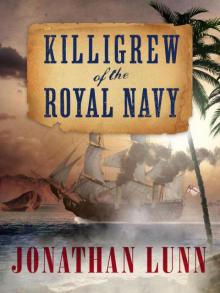 Killigrew of the Royal Navy
Killigrew of the Royal Navy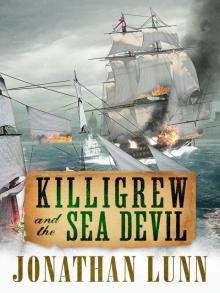 Killigrew and the Sea Devil
Killigrew and the Sea Devil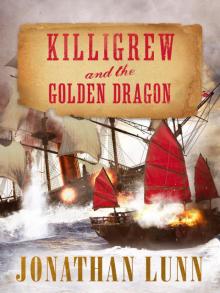 Killigrew and the Golden Dragon
Killigrew and the Golden Dragon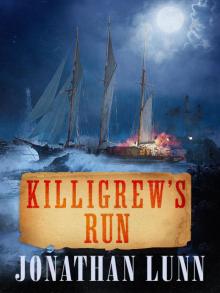 Killigrew’s Run
Killigrew’s Run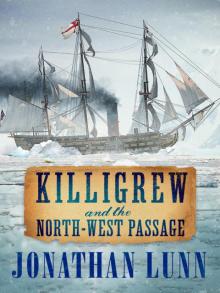 Killigrew and the North-West Passage
Killigrew and the North-West Passage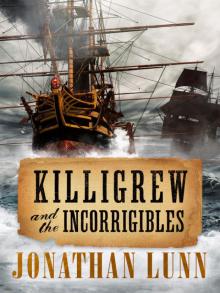 Killigrew and the Incorrigibles
Killigrew and the Incorrigibles